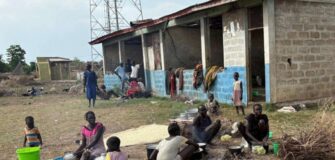Diplomatic Tensions Escalate as Trump and Ramaphosa Clash Over Farm Violence Claims
Share
A new chapter of diplomatic discord between the United States and South Africa erupted this week, sparked by a provocative presentation from former U.S. President Donald Trump during a critical bilateral meeting with South African President Cyril Ramaphosa. Trump unveiled a controversial video he claimed showed distressing images of mass graves of white farmers, leveraging it to amplify his alarming allegation of a systematic “white genocide” taking place in South Africa.
The reaction from South African authorities was immediate and resolute. Police Minister Senzo Mchunu took to the airwaves with a vehement defense, clarifying that the footage referenced by Trump actually showcased a solemn memorial dedicated to farmers who tragically lost their lives in violent attacks, notably during a tense protest in 2020. Mchunu passionately emphasized that the reality of farm violence affects not only white farmers but also Black farmers, asserting that these incidents are not born of racial animosity or part of any orchestrated campaign targeting a specific ethnic group.
“While farm attacks represent a serious and pressing challenge for our rural communities, it is crucial to recognize that these violent episodes are not restricted to one racial group,” Mchunu declared. He further highlighted the South African government’s diligent efforts to enhance rural safety, strengthen community policing initiatives, and implement programs to reduce violence across all segments of society.
This incident further strained diplomatic relations when South Africa delicately navigated its international alliances with major powers such as the United States, China, and Russia. Moreover, Trump’s remarks have reignited global debates on the contentious issue of land reform in South Africa. This politically charged topic consistently attracts international scrutiny and often incites a wave of misinformation.
In response to this controversy, South African officials have urged for calm and restraint in public discourse, warning that the spread of incendiary rhetoric could deepen divisions within communities and hinder ongoing efforts toward national reconciliation and unity.
Image Source:fr.org


